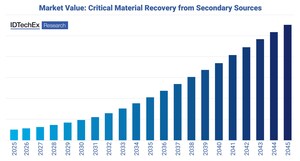BOSTON, May 29, 2024 /PRNewswire/ -- Metamaterials use regular engineered patterns of subwavelength structures to interact with waves. Electromagnetic metamaterials promise to have transformative effects within the fields of optics and telecommunications. They could make biometric recognition cheaper and more accurate, make virtual reality more immersive and comfortable, and facilitate high-speed mobile internet with zero signal blackspots, yet adoption is in its infancy.
In "Optical & Radio Frequency Metamaterials 2024-2034: Markets, Players, Technologies", IDTechEx comprehensively examines the emerging technology of electromagnetic metamaterials in its second edition of this report. Drawing from interviews with companies across the value chain and IDTechEx's existing research on optical, telecommunication, and emerging materials, the report evaluates the market for optical and radio-frequency (RF) metamaterials in various applications. It analyzes each application's requirements and includes case studies of existing players.
The report identifies reconfigurable intelligent surfaces (RIS) in telecommunications and metalenses in smartphone cameras as significant opportunities. Through detailed segmentation, it presents a comprehensive overview of the status and market potential of each application. The forecast predicts the overall market to reach US$14.9B by 2034, driven by improved biometric sensing in smartphones via metalenses and increasing 5G mmWave rollout growing adoption of RIS.
Market for RF (Radio-frequency) metamaterials
RF metamaterials find applications across multiple sectors, including telecommunications, automotive, aerospace, and security. They can be utilized in Reconfigurable Intelligent Surfaces (RIS) to reflect, steer, and shield electromagnetic radiation, compensating for the reduced range associated with higher frequency signals. Additionally, in radar beamforming, RF metamaterials enable active steering of EM radiation to enhance angular resolution. This could be particularly beneficial for automotive radar systems. RF metamaterials can also be used for effective EMI shielding, enhancing security by preventing signal leakage, and can be frequency selective to create transparent shields. RF metamaterials also hold potential for medical sensing applications such as MRI scans and non-invasive glucose monitoring.
According to IDTechEx's forecast, the largest market for RF metamaterials is forecasted to be in Reconfigurable Intelligent Surfaces (RIS) for 5G mmWave and future 6G communications. Both 5G mmWave and 6G offer significant advantages, including the potential for leveraging expansive bandwidth to support peak data flow ranging from gigabits to terabits per second and maintaining ultra-low latency.
However, utilizing high-frequency spectra presents challenges such as very short signal propagation range (cm range for above 100 GHz frequency) and line-of-sight obstacles. Addressing signal decay and establishing strong communication over reasonable distances is a priority for both technologies, especially in busy urban areas where consistent connectivity despite barriers is crucial.
Establishing numerous base stations is not cost-effective in providing adequate coverage for high-frequency spectra like 5G mmWave and 6G. In contrast, metamaterial RIS can reflect and direct signals to end users, increasing signal range and strength while consuming low energy. Additionally, integrating metamaterial-based coatings with windows can improve signal coverage by reflecting beams around obstacles in urban areas. These solutions provide wide area coverage and offer vast opportunities for materials integration.
Market for optical metamaterials
Relatively simple optical metamaterials based on biomimicry of moth-eye structures have a relatively long history of use as antireflective (AR) coatings in high-end camera lenses. However, metalenses fabricated using semiconductor industry processes are expected to have a huge impact, initially driven by their ability to improve the performance of computer vision systems.
In 2022, metalenses designed by fabless player Metalenz saw commercialization in time-of-flight (ToF) sensors from STMicro, marking the first commercial use of this technology. Here, metalenses improved light-gathering performance in a smaller package than the optics they replaced. The biggest value in metalenses comes in their ability to add additional optical functionality, such as allowing for polarization imaging in a very compact package. This has a huge potential application in facial biometrics for smartphones and could bring facial recognition to smartphones outside of Apple's range in the near future, with Metalenz announcing sensor modules designed for this application in late 2023.
Metalenses based on liquid crystals are expected to have a significant impact in VR headsets, where they could be used to solve the vergence-accommodation conflict and help these devices pass the "visual Turing test". Furthermore, active optical metasurfaces could contribute to making LiDAR more compact and broadening the markets where these sensors could be used.
The biggest limiting factor for metalenses is broad spectrum performance, but significant innovation in the design of the metasurfaces themselves and software compensation is expected to make them a more compact and lower-cost replacement for lenses in smartphone cameras within the next ten years. Ultimately, metalenses have the potential to disrupt many corners of the optics industry in the near future.
IDTechEx has been studying emerging materials and photonics technologies and their market opportunities for a decade, utilizing extensive primary research. "Optical & Radio Frequency Metamaterials 2024-2034: Markets, Players, Technologies" provides a comprehensive picture of the underlying technologies, manufacturing methods, and application opportunities of both optical and radio-frequency metamaterials.
To find out more about this IDTechEx report, including downloadable sample pages, please visit www.IDTechEx.com/Meta.
For the full portfolio of 5G, 6G, RFID and telecoms market research from IDTechEx, please see www.IDTechEx.com/Research/5G.
Upcoming free-to-attend webinar
Exploring the Transformative Potential of Electromagnetic Metamaterials
Sam Dale, Senior Technology Analyst at IDTechEx, and Dr Yu-Han Chang, Principal Technology Analyst at IDTechEx, will be presenting a free-to-attend webinar on the topic on Thursday 20 June 2024 - Exploring the Transformative Potential of Electromagnetic Metamaterials.
Key points covered will include:
- A brief introduction to RF (radio frequency) and optical metamaterials, highlighting key market opportunities
- Analysis of the emerging usage of metalenses, one of the most exciting applications of optical metamaterials, with important manufacturing processes potential challenges highlighted
- Analysis of Reconfigurable Intelligent Surfaces (RIS), the most promising applications of RF metamaterials, with discussion on players, technology roadmap, key case studies, etc
- Adoption roadmaps for optical and RF metamaterials
- Outlook for the electromagnetic metamaterials market
Please click here to check timings and register for your specific time zone.
If you are unable to make the date, please register anyway to receive the links to the on-demand recording (available for a limited time) and webinar slides as soon as they are available.
About IDTechEx:
IDTechEx provides trusted independent research on emerging technologies and their markets. Since 1999, we have been helping our clients to understand new technologies, their supply chains, market requirements, opportunities and forecasts. For more information, contact research@IDTechEx.com or visit www.IDTechEx.com.
Images download:
Media Contact:
Lucy Rogers
Sales and Marketing Administrator
press@IDTechEx.com
+44(0)1223 812300
Social Media Links:
Twitter: www.twitter.com/IDTechEx
LinkedIn: www.linkedin.com/company/IDTechEx
Photo - https://mma.prnewswire.com/media/2424435/IDTechEx_10_Year_Forecasts_Report.jpg
Logo - https://mma.prnewswire.com/media/478371/IDTechEx_Logo.jpg






Share this article